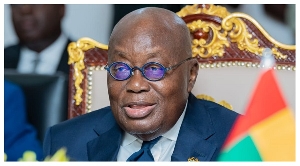- Home - News
- TWI News | TV
- Polls
- Year In Review
- News Archive
- Crime & Punishment
- Politics
- Regional
- Editorial
- Health
- Ghanaians Abroad
- Tabloid
- Africa
- Religion
- Election 2020
- Coronavirus
- News Videos | TV
- Photo Archives
- News Headlines
- Press Release
General News of Tuesday, 21 November 2006
Source: Statesman
Editorial: Building homes for Ghanaians, a priority
Constructing a property owning democracy constitutes the arteries that feed the philosophical heart of the ruling New Patriotic Party government, yet inheriting a system that did not share that philosophy, the country’s affordable housing stock had fallen through the crisis pit.
With rural-to-urban migration, population growth and all, homelessness and pressure on the low urban housing stock was bound to be on the increase in Ghana. Not only do very few Ghanaians own their own properties, but many are unable to even secure rented accommodation. While opponents of Government have lampooned the doctrine of property-owning democracy as elitist, the ongoing construction of 1,138 flats at Borteyman, 1400 flats at Kpone, 1,192 flats at Asokore Mampong and the prices at which Government aims to sell them (about $10,000) give enough indication that indeed property-ownership can be democratised, given the will-power.
Yet, if the target of a nation of homeowners is ever to become a reality, we must show more seriousness in these three main areas.
Firstly, the process of conveyancing and property ownership must be streamlined and its integrity radically enhanced. The situation where you are more likely to buy litigation rather than land title should be reversed.
Secondly, more affordable housing must be built. The property market in Ghana, and private sector developers coming in to build houses, are strongly weighted towards Ghanaians living abroad – luxury houses for those on a foreign salary, rather than reasonably priced accommodation that could help to tackle the rising problem of homelessness and overcrowding in this country.
Thirdly, we need a mortgage system that works: with reasonable interest rates, and incentives for financial institutions to bring out attractive mortgage packages for potential homeowners. We need a vibrant, competitive mortgage culture, with more banks and financial institutions providing the service. Next year’s budget, read in Parliament last Thursday, makes several important provisions towards these ends – and today The Statesman welcomes these moves. Under the National Housing Programme, for example, the Ministry of Water Resources, Works and Housing plans to construct 20,000 affordable housing units annually, for the next five years. We are yet to be persuaded by the evidence on the ground if these ambitious numbers will be attained, though.
In addition, we need to redefine urbanisation to mean city expansion rather than overcrowding. So we welcome development projects outside the main urban areas, such as the housing project at Amasaman in the Greater Accra Region. Pushing development outside the city centres encourages economic growth there. The final draft of a National Housing Policy is soon to be put before Cabinet. More still needs to be done, however, to nurture more public-private sector partnership in the property industry – with Government incentives for developers to build affordable housing projects, such as concessionary loan packages, similar to what is being put in place for some public workers. The budget announcement that Government has made available loans to the HFC Bank to provide mortgage loans at favourable rates to public sector employees is another positive step forward.
Initially, this facility will be made available to employees in the judiciary, medical services, Ghana Education Service, the civil service, the military, police and other security agencies. The scheme will be expanded eventually to cover the wider public sector.
It is hoped that the scheme will finally bring home ownership within the grasp of the ordinary worker – who is sick of pouring away funds on rented accommodation rather than investing in property, a saving for the future. However, on the issue of the 1963 Rent Act (Act 220), for example – which forbids landlords to demand more than six months’ advance or deposit to secure a property, a rule that is almost universally breached across Ghana – change was promised three years ago.
“It has become increasingly clear that, the practice of landlords/landladies demanding two to three years rent advance is a problem for ordinary workers as well as prospective foreign investors.
“Government has, therefore, decided that the Rent Act should be updated and enforced to protect workers and also to promote business in this country. In this regard, proposals will soon be presented to this House for consideration.” This was the budget promise of the then Finance Minister, Yaw Osafo Maafo, in 2003. Today, that promise remains unfulfilled, with an announcement in this year’s budget that the review is on-going and the final draft document is ready for final stakeholders consultations, but has yet to be presented to Parliament and Cabinet for approval.
If Government’s other promises on home-ownership and on housing are to be successful, their implementation must be more rigorous than this. The 2007 budget contains an apparent blueprint for solving at least some of Ghana’s housing problems – let’s put pressure on Government to make sure they follow through with these plans, especially those of us who believe in property-owning democracy.










